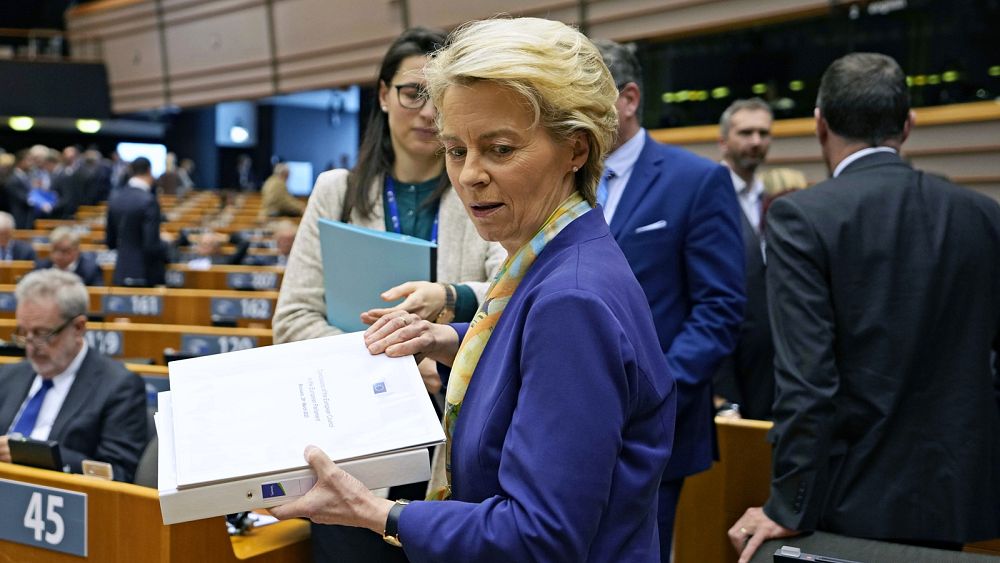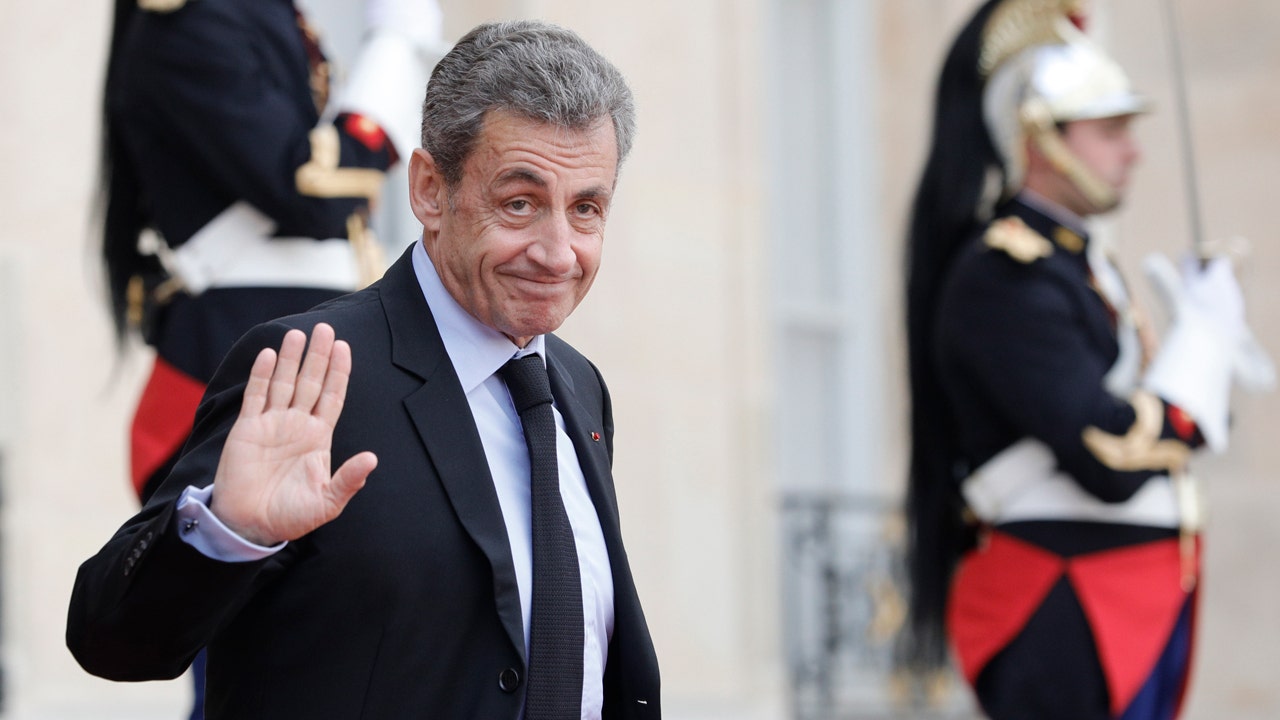World
Back to work: the EU’s to-do list between now and the 2024 elections

After a month-long summer break, the European Union is back to work.
It’s officially the rentrée for the EU as glowingly tanned, freshly revitalised eurocrats return to Brussels this week after deserting the Belgian capital for the summer holidays.
And this first week of September feels all the most momentous as the bloc approaches the next election to the European Parliament. With the ballot scheduled to be held between 6 and 9 June 2024, the institutions are now gearing up for a final push to wrap up the main pending tasks before going into full-time campaign mode.
With the clock ticking, Euronews breaks down the EU’s to-do list.
The promise made to Kyiv
From the energy mix to defence spending, the fallout of Russia’s war on Ukraine has prompted a profound rethink of most elements of EU policy, with radical proposals that a few years ago would have been unimaginable.
Not all the questions have been answered, though.
In June last year, member states took the bold step of granting Ukraine the coveted status of candidate country. The moment was hailed as a geopolitical victory for the war-torn nation and a strong rebuke of the Kremlin’s imperialism. But Kyiv now wants Brussels to prove that good intentions are more than words.
The European Commission is set to release its enlargement report in October, the first time the executive will publish a thorough, detailed assessment of Ukraine’s progress in its membership path. The findings will be used by EU leaders to unanimously decide whether they open formal accession talks with Kyiv or ask for additional conditions.
President Volodymyr Zelenskyy and his deputies have insisted the negotiations should begin before the end of the year, an ambitious timeline that suggests any hesitation in Brussels will be met with nothing but fury.
Watch out for the European Council to be held between 14 and 15 December.
Also on the to-do list are a new €20-billion plan to provide Kyiv with military support on a long-term, predictable basis, and the ongoing dispute with tariff-free imports of Ukrainian grain, which have become enormously controversial in Eastern Europe.
The Kremlin’s hefty bill
The motto “make Russia pay” has officially become EU jargon. It refers to using Russian-owned assets, both private and public, to pay for the reconstruction of Ukraine, which the World Bank estimates to cost at least $411 billion (€380 billion).
In the case of the EU, the main focus is on the €200 billion in assets of the Russian Central Bank that have been immobilised as a result of the financial sanctions.
Since this money cannot be confiscated under international law, Brussels initially floated a plan to re-invest the central bank’s reserves and channel the yearly proceedings into rebuilding Ukraine. Later, that project morphed into an undefined tax on the windfall profits reaped by the custodians of the assets, which the European Commission promised to unveil before the summer break – and then didn’t.
The delay was far from surprising: the European Central Bank, financial experts and legal scholars have all raised serious concerns about the unprecedented initiative, warning the unilateral move could trigger financial instability and damage the euro’s credibility.
Mindful of the criticism, the Commission said it would stick to the plan but act “prudently.” After raising such high expectations, it’s hard to see Brussels making a complete U-turn so we should expect to see a full-fledged proposal, even if watered-down to a fault, in the coming months, possibly before December.
And another pending task: sanction the import of Russian diamonds once and for all.
Money makes the EU go round
Money – we all want it. But where can we get it from?
This burning question will define the political debate between now and the elections. The European Commission has proposed a top-up of €66 billion to the bloc’s seven-year-long budget in order to deal with new challenges, including €17 billion in grants for Ukraine, €15 billion for migration management, €10 billion to finance strategic technologies and €18.9 billion to pay for the debt incurred with the COVID-19 recovery fund.
While establishing the so-called “Ukraine Facility” has garnered ample support among member states, the primary backers of the budget, the thought of coughing up almost €50 billion in additional expenses has received a tepid response from governments, whose public coffers are in a rough state after back-to-back crises.
Adding fuel to the fire, the budget talks will take place in parallel to another crucial debate: the reform of the EU’s fiscal rules, which have been suspended since the onset of the pandemic and need to be overhauled before their reactivation in January 2024.
The proposal on the table maintains the long-standing limits of 3% for deficit-to-GDP and 60% for debt-to-GDP and introduces a greater deal of flexibility and ownership to help member states sanitise their finances according to their national specificities.
The approach has been welcomed by highly indebted countries like France, Italy and Spain, but has raised the suspicions of Germany, the Netherlands and Denmark, who want to see stronger guarantees to slash debt levels. Expect a feisty fight.
The migration taboo, finally broken
For years, migration policy was the no-go area of EU policy. Successive efforts to design a common and coordinated framework to deal with the arrival of migrants were bound to instant failure. Member states were too far apart to even have a proper conversation.
But earlier this year, progress on the “New Pact on Migration and Asylum,” a long-stalled proposal that encompasses and remakes the main pillars of migration policy, started to be made.
The first major breakthrough arrived in June when home affairs ministers reached a preliminary deal on a system of “mandatory solidarity,” designed to make all member states, regardless of their collection and economic weight, responsible for the reception and relocation of asylum seekers. The deal broke the perennial impasse and kicked off formal negotiations between the EU Council and the European Parliament, which must now agree on the details of the complex legislation.
If the momentum is sustained, the bloc could very well have its first-ever collective system of migration management by the time EU citizens go to the polls.
Green dreams are made of this
Shortly after Ursula von der Leyen became president of the European Commission, she stood before the press to present the European Green Deal, an exceptionally ambitious and radical undertaking to irreversibly transform the bloc’s economy, reinvent our consumption patterns and achieve climate neutrality by 2050.
“This is Europe’s ‘man on the moon’ moment,” von der Leyen said in December 2019.
Almost four years later, the Green Deal has become tangible thanks to a raft of legislative proposals that member states and MEPs managed to approve, such as a phased-in ban on the combustion engine, a tax on polluting imports, beefed-up targets for energy efficiency and a €300-billion plan to wean the bloc off Russian fossil fuels.
This has led to a surge in renewables: wind and solar power produced more electricity than gas in 2022, a first in the bloc’s history. Meanwhile, the energy crisis has amplified savings patterns in both households and industry, diminishing demand.
But the EU has seen a growing backlash against environmental policies, as exposed by the bitter political fight over the Nature Restoration Law, which barely survived a knife-edge vote in the European Parliament.
The contentious law is one of the last pieces in the Green Deal’s pipeline, together with the revision of the Renewable Energy Directive (RED), a reform of the electricity market, and an industrial strategy to boost the domestic production of net-zero technology.
The issue of nuclear energy, led by France, permeates all these conversations.
The tech on everybody’s lips
Member states and MEPs are knee-deep in negotiations for the Artificial Intelligence Act, which aims to ensure the development of human-centric, ethically responsible and environmentally sustainable AI systems across Europe.
The law would introduce a pyramid-like structure that splits AI-powered products according to their potential risks to society and imposes different market rules to prevent unintended consequences, such as violations of fundamental rights, discrimination, plagiarism, impersonation and the spread of disinformation.
Since its presentation in April 2021, the AI Act has been subject to intense lobbying, media scrutiny and political bargaining, with MEPs filing thousands of amendments to the original text. The abrupt emergence of chatbots, like OpenAI’s ChatGPT and Google’s Bard, drastically changed the tune of the debate and piled pressure on negotiators to reach an agreement before the end of the year.
One of the points of contention remains the deployment of real-time biometric identification in public spaces. The European Parliament is keen to ban the practice altogether, while member states want to retain exceptions for law enforcement.
If eventually passed, the AI Act will become the world’s first law to rein in the excesses of this ever-evolving technology in a comprehensive manner.
Bonus tasks
The EU’s to-do list doesn’t end here: a not-so-little pile of legislative files is hoping to reach a successful conclusion before the 2024 elections.
The order of business includes, among others, the Critical Raw Materials Act, a law to reduce dependency on foreign suppliers of rare earths; the Media Freedom Act, which aims to protect European journalists from spyware and political interference; and an ethics body to crack down on corruption across the EU institutions; as well as a renewed push to finally complete the EU-Mercosur free trade deal, which has been more than 20 years in the making.

World
The Year in Pictures 2024: Far From Ordinary

When shots were fired at a campaign rally for former President Donald J. Trump on a July evening in Butler, Pa., the veteran New York Times photographer Doug Mills was just a few feet from him. As the Secret Service rushed toward Mr. Trump, Mr. Mills’s heart pounded when he realized what was happening.
Then instinct took over. Mr. Mills kept taking pictures, at an extremely fast shutter speed of one eight-thousandth of a second, capturing an image that illustrates the magnitude of that moment: Mr. Trump, his face streaked with blood, his fist raised in defiance.
This year was made up of such extraordinary moments. And Times photographers captured them in extraordinary images. The Year in Pictures brings you the most powerful, evocative and history-making of those images — and allows you to see the biggest stories of 2024 through our photographers’ eyes.
The presidential campaign — full of twists and turns — provided some of our most memorable photos. Kenny Holston captured a shaky President Biden struggling to find his footing in what turned out to be his only debate of the 2024 election. Erin Schaff conveyed the exhilaration surrounding Vice President Kamala Harris in the short sprint of her campaign. And Todd Heisler brought home the excitement of an 8-year-old girl in pigtails, Ms. Harris’s great-niece, who watched with pride as Ms. Harris accepted her party’s nomination for president.
Yet even as the American political campaign intensified, wars ground on overseas, creating new dangers and obstacles for our photojournalists determined to document the fighting. The war between Hamas and Israel escalated into a regional conflict, and our photographers depicted the Israeli airstrikes on Lebanon, the families forced to flee their homes and the neighborhoods reduced to rubble.
When Israeli forces recovered the bodies of six hostages in Gaza, our photographers revealed the pain of the captives’ families as they cried out at their loved ones’ funerals after 11 months of anguished waiting. And last month, Samar Abu Elouf, a Palestinian photographer for The Times, delivered some of the most indelible images of the year: a series of portraits of Gazans horribly injured in the war, including children who had lost arms, legs or eyes.
Children were also central to the work of Lynsey Addario, a veteran photographer who has been chronicling the war in Ukraine since Russia first invaded in 2022. Ms. Addario’s images tell the stories of young Ukrainians with cancer whose treatment was disrupted by the war, often with devastating results. One, a 5-year-old girl whose chemotherapy was upended by the Russian invasion, ultimately lost her life.
Our photographers embrace their calling of bearing witness to history, showing readers the atrocities and the suffering that might otherwise be overlooked. But they also see their mission more broadly, and aim to depict the richness and color of life by regularly bringing us pictures that delight and surprise.
Take the photo by Hiroko Masuike from the ticker-tape parade in October for the New York Liberty women’s basketball team. The young fans pictured radiate a kind of awe-struck joy, screaming to the players by name. Or the photographs that show the sense of wonder on the faces of people at Niagara Falls as they bask in the magic of a solar eclipse in April.
We hope you can spend some time with these pictures, and take in our photographers’ reflections on them. This collection of images is a way to remember the year, but it is also, we hope, an opportunity to better understand their craft and their devotion to producing the world’s best photojournalism.
Curation
Tanner Curtis, Jeffrey Henson Scales
Interviews
Dionne Searcey
Editing
Natasha King
Digital Design
Matt Ruby
Print Design
Mary Jane Callister, Felicia Vasquez
Production
Peter Blair, Eric Dyer, Wendy Lu, Nancy Ramsey, Jessica Schnall, Hannah Wulkan
Additional Production
Anna Diamond
New York Times Director of Photography
Meaghan Looram
World
French high court upholds ex-president's corruption conviction

France’s highest court has upheld an appeal court decision which had found former President Nicolas Sarkozy guilty of corruption and influence peddling while he was the country’s head of state.
Sarkozy, 69, faces a year in prison, but is expected to ask to be detained at home with an electronic bracelet — as is the case for any sentence of two years or less.
He was found guilty of corruption and influence peddling by both a Paris court in 2021 and an appeals court in 2023 for trying to bribe a magistrate in exchange for information about a legal case in which he was implicated.
“The convictions and sentences are therefore final,” a Court of Cassation statement on Wednesday said.
FRANCE’S MACRON NAMES CENTRIST ALLY BAYROU AS NEXT PRIME MINISTER
Sarkozy, who was France’s president from 2007 to 2012, retired from public life in 2017 though still plays an influential role in French conservative politics. He was among the guests who attended the reopening of Notre Dame Cathedral earlier this month.
Sarkozy, in a statement posted on X, said “I will assume my responsibilities and face all the consequences.”
He added: “I have no intention of complaining. But I am not prepared to accept the profound injustice done to me.”
Sarkozy said he will seek to bring the case to the European Court of Human Rights, and hopes those proceedings will result in “France being condemned.”
He reiterated his “full innocence.”
“My determination is total in this case as in all others,” he concluded.
FILE – Former French President Nicolas Sarkozy leaves the Elysee Palace after a lunch with heads of states and officials, Monday, Sept. 30, 2019 in Paris. (AP Photo/Kamil Zihnioglu, File)
Sarkozy’s lawyer, Patrice Spinosi, said his client “will comply” with the ruling. This means the former president will have to wear an electronic bracelet, Spinosi said.
It is the first time in France’s modern history that a former president has been convicted and sentenced to a prison term for actions during his term.
Sarkozy’s predecessor, Jacques Chirac, was found guilty in 2011 of misuse of public money during his time as Paris mayor and was given a two-year suspended prison sentence.
Sarkozy has been involved in several other legal cases. He has denied any wrongdoing.
He faces another trial next month in Paris over accusations he took millions of dollars from then-Libyan dictator Moammar Gadhafi to illegally finance his successful 2007 campaign.
The corruption case that led to Wednesday’s ruling focused on phone conversations that took place in February 2014.
At the time, investigative judges had launched an inquiry into the financing of Sarkozy’s 2007 presidential campaign. During the inquiry, they discovered that Sarkozy and his lawyer, Thierry Herzog, were communicating via secret mobile phones registered to the alias “Paul Bismuth.”
Wiretapped conversations on those phones led prosecutors to suspect Sarkozy and Herzog of promising magistrate Gilbert Azibert a job in Monaco in exchange for leaking information about another legal case involving Sarkozy. Azibert never got the post and legal proceedings against Sarkozy have been dropped in the case he was seeking information about.
Prosecutors had concluded, however, that the proposal still constitutes corruption under French law, even if the promise wasn’t fulfilled. Sarkozy vigorously denied any malicious intention in his offer to help Azibert.
Azibert and Herzog have also been found guilty in the case.
World
EU ministers water down proposal on child sexual abuse

A proposal on combatting child sexual abuse has been watered down by some EU justice ministers, with others expressing their regret at certain elements of the proposal being removed entirely.
With the development of new technologies, sexual abuse of children has seen a rise in Europe.
The EU is therefore looking to update its directive on combatting the sexual abuse and sexual exploitation of children, which dates back to 2011.
However, the EU Commission’s initial proposal has been watered down by the justice ministers of several EU countries. Seven Member States, which include Belgium, Finland and Ireland, expressed their regret at the removal of certain parts of the proposal.
“We deeply regret that the majority of Member States were unable to support a more ambitious approach aimed at ensuring that children who have reached the age of sexual consent receive the strongest and most comprehensive legal protection possible against unwanted sexual acts,” they wrote in a press release.
Key issues remained unaddressed
Isaline Wittorski, EU regional coordinator at child rights organisation ECPAT International, is particularly concerned regarding Member States’ opposition to the extension of the limitation period for pursuing child sexual abuse cases.
She also regrets that “grooming” – the process by which an adult intentionally approaches minors and manipulates them for sexual purposes – for children who have reached the age of sexual consent was not addressed by the Council.
“The Member States expressly refused to recognise in the text that a child in a state of shock or intoxication cannot be considered to have consented to sexual abuse”, she adds.
Harmonisation of penalties
The Commission’s proposal aims to harmonise the definition of sexual violence against minors and penalties within the EU.
It will also update criminal law in order to criminalise the rape of children broadcast live on the internet, as well as the possession and exchange of paedophile manuals and child abuse deepfakes.
MEPs, for their part, should support a more ambitious directive. Birgit Sippel, a German MEP (S&D), is calling for longer limitation periods.
“Many children who have been abused take years or even decades before they dare to go to court or to a police station. So this is a very important step that is missing from the current directive,” the MEP told Euronews.
“Unfortunately, what I see is that the Council is watering down almost everything that could improve the current directive. It will therefore be very important for the EU Parliament to maintain a very strong position and force the Council to go further and not limit itself to the current directive,” she added.
The proposal’s text can still be amended. After a vote by MEPs, negotiations will take place between the EU Commission, the European Council and the European Parliament.
It is estimated that one in five children in Europe is a victim of some form of sexual violence.
In 2022 alone, there were 1.5 million reports of child sexual abuse in the EU.
Ministers also failed to reach agreement on another regulatory text aimed at combatting the sexual abuse of children online, which aims to force platforms to detect and remove content depicting sexual violence against minors. This proposal caused a clash between children’s rights defenders and privacy protection lobbies.
-

 Business1 week ago
Business1 week agoOpenAI's controversial Sora is finally launching today. Will it truly disrupt Hollywood?
-

 Politics5 days ago
Politics5 days agoCanadian premier threatens to cut off energy imports to US if Trump imposes tariff on country
-
/cdn.vox-cdn.com/uploads/chorus_asset/file/25782636/247422_ChatGPT_anniversary_CVirginia.jpg)
/cdn.vox-cdn.com/uploads/chorus_asset/file/25782636/247422_ChatGPT_anniversary_CVirginia.jpg) Technology6 days ago
Technology6 days agoInside the launch — and future — of ChatGPT
-
/cdn.vox-cdn.com/uploads/chorus_asset/file/25789444/1258459915.jpg)
/cdn.vox-cdn.com/uploads/chorus_asset/file/25789444/1258459915.jpg) Technology5 days ago
Technology5 days agoOpenAI cofounder Ilya Sutskever says the way AI is built is about to change
-

 Politics5 days ago
Politics5 days agoU.S. Supreme Court will decide if oil industry may sue to block California's zero-emissions goal
-
/cdn.vox-cdn.com/uploads/chorus_asset/file/25546252/STK169_Mark_Zuckerburg_CVIRGINIA_D.jpg)
/cdn.vox-cdn.com/uploads/chorus_asset/file/25546252/STK169_Mark_Zuckerburg_CVIRGINIA_D.jpg) Technology5 days ago
Technology5 days agoMeta asks the US government to block OpenAI’s switch to a for-profit
-

 Politics6 days ago
Politics6 days agoConservative group debuts major ad buy in key senators' states as 'soft appeal' for Hegseth, Gabbard, Patel
-

 Business3 days ago
Business3 days agoFreddie Freeman's World Series walk-off grand slam baseball sells at auction for $1.56 million














































































































